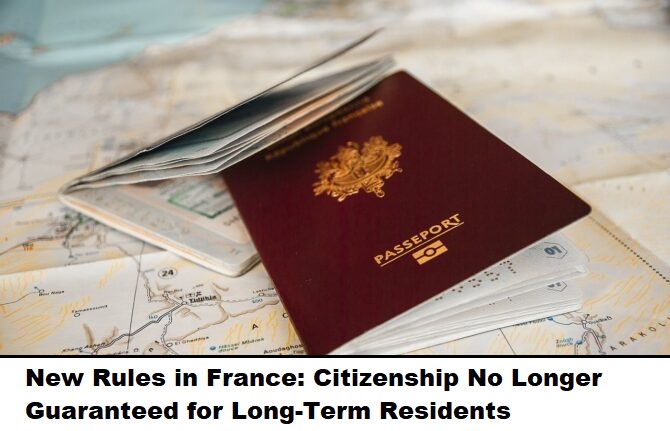France has recently introduced a major policy shift regarding how long-term residents can acquire French citizenship.
Under the new rules, simply living in France for an extended period will no longer guarantee the right to become a citizen. This change has sparked widespread debate, especially among immigrant communities, legal experts, and human rights advocates.
In this article, we’ll explain what has changed, why the French government has taken this step, and what it means for long-term residents, expats, and prospective immigrants.

What Has Changed in France’s Citizenship Policy?
For decades, long-term residence in France was a key pathway to citizenship. Typically, foreigners who legally resided in France for 5 consecutive years (or 2 years for students) could apply for naturalization, provided they met certain conditions like language proficiency and integration into French society.
However, the new legislation passed in 2025 introduces stricter criteria:
Long-term residency alone is no longer sufficient to qualify for citizenship.
Applicants must now demonstrate “exceptional integration”, beyond just years of residence.
Authorities will place greater emphasis on:
Employment history and contribution to the economy
Adherence to French cultural values
No criminal record
Active civic participation
Cases will be reviewed on a more individual basis, allowing the government to deny applications even if the residency duration is met.
Why Has France Made This Change?
The French government cites several reasons for this policy shift:
Social Cohesion: Officials argue that citizenship should reflect a deep commitment to French values and active participation in society.
Security Concerns: Stricter vetting is aimed at ensuring that applicants uphold the principles of the Republic.
Political Pressure: Immigration has become a hot-button issue in French politics, with growing demands for tighter controls on naturalization.
Impact on Long-Term Residents and Immigrants
This new policy affects thousands of immigrants and foreign residents who hoped for a clearer path to French citizenship.
Increased Uncertainty: Long-term residents now face additional hurdles, making naturalization less predictable.
Greater Scrutiny: Applicants will undergo more detailed background checks and assessments of their integration efforts.
Discouragement for Newcomers: Stricter rules might deter skilled migrants and students from choosing France as a long-term destination.
Reactions & Criticism
Human rights organizations and immigrant advocacy groups have criticized the new rules:
“Integration is a two-way process,” said a spokesperson for Amnesty International France. “Punishing long-term residents who have built lives here contradicts the values of liberty, equality, and fraternity.”
Some argue that this policy could deepen social divisions rather than promote cohesion.
What Should Long-Term Residents Do Now?
If you’re a long-term resident aiming for French citizenship, here are some steps to strengthen your application:
Improve Your French Language Skills
Advanced proficiency is now even more critical.
Show Active Civic Participation
Volunteer, join community groups, and engage in local initiatives.
Maintain a Clean Legal Record
Any criminal offenses could jeopardize your application.
Demonstrate Economic Contribution
Stable employment, paying taxes, and contributing to the economy will weigh heavily in evaluations.
Conclusion
France’s new citizenship rules mark a significant turning point in its immigration policy. While the government frames this as a move towards preserving national identity and values, critics warn of potential exclusion and alienation of immigrant communities.
For long-term residents, the path to French citizenship has become more complex — but not impossible. Staying informed, proactive, and engaged will be key to navigating these changes.



